| ◄ APRIL ► | ||||||
|---|---|---|---|---|---|---|
| ◄ 1951 ► | ||||||
| 1 | 2 | 3 | 4 | 5 | 6 | 7 |
| 8 | 9 | 10 | 11 | 12 | 13 | 14 |
| 15 | 16 | 17 | 18 | 19 | 20 | 21 |
| 22 | 23 | 24 | 25 | 26 | 27 | 28 |
| 29 | 30 | |||||
| President: | Harry S Truman (D) | |||
| Vice-President: | Alben W. Barkley (D) | |||
| House: | 233 (D) | 200 (R) | 1 (Other) | 1 (Vacant) |
| Southern states: | 103 (D) | 2 (R) | ||
| Senate: | 49 (D) | 47 (R) | ||
| Southern states: | 22 (D) | |||
| GDP growth: | 7.3% | (Annual) | ||
| 2.1% | (Quarterly) | |||
| Inflation: | 9.3% | |||
| Unemployment: | 3.1% | |||
| US killed in action, | 1,211 | (This month) | ||
| Korean conflict: | 19,752 | (Since Jun 28, 1950) | ||
![]() Apr 4: U.N. troops under the command of Gen. Douglas MacArthur push across the 38th Parallel and into North Korea. MacArthur orders this move a week after Defense Secretary Gen. George C. Marshall ordered MacArthur to halt his northward advance at the 38th Parallel.
Apr 4: U.N. troops under the command of Gen. Douglas MacArthur push across the 38th Parallel and into North Korea. MacArthur orders this move a week after Defense Secretary Gen. George C. Marshall ordered MacArthur to halt his northward advance at the 38th Parallel.
![]() Apr 5: House Minority Leader Joseph Martin, Jr., (R-MA) reads a letter in the House from Gen. Douglas MacArthur repudiating the Truman Administration’s policy on the Korean War. Douglas argues that a second front against China should be opened from Taiwan. “Here we fight Europe’s war with arms while the diplomats there still fight it with words,” MacArthur writes. “If we lose the war to communism in Asia the fall of Europe is inevitable, win it and Europe most probably would avoid war and yet preserve freedom.”
Apr 5: House Minority Leader Joseph Martin, Jr., (R-MA) reads a letter in the House from Gen. Douglas MacArthur repudiating the Truman Administration’s policy on the Korean War. Douglas argues that a second front against China should be opened from Taiwan. “Here we fight Europe’s war with arms while the diplomats there still fight it with words,” MacArthur writes. “If we lose the war to communism in Asia the fall of Europe is inevitable, win it and Europe most probably would avoid war and yet preserve freedom.”
![]()
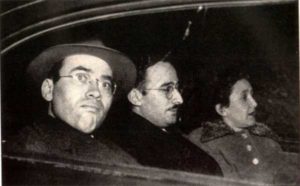 Apr 5: Julius and Ethel Rosenberg are sentenced to death for conspiracy to commit espionage. A third defendant, Morton Sobell, is sentenced to thirty years in federal prison. He will be released in 1969 after serving seventeen years and nine months. The following day, David Greenglass, Ethel Rosenberg’s brother, will be sentenced to fifteen years in prison. His reduced sentence is in exchange for his testimony against his sister and brother-in-law.
Apr 5: Julius and Ethel Rosenberg are sentenced to death for conspiracy to commit espionage. A third defendant, Morton Sobell, is sentenced to thirty years in federal prison. He will be released in 1969 after serving seventeen years and nine months. The following day, David Greenglass, Ethel Rosenberg’s brother, will be sentenced to fifteen years in prison. His reduced sentence is in exchange for his testimony against his sister and brother-in-law.
![]() Apr 6: The Third District Court of Appeals orders the Regents of the University of California to reinstate twenty-six faculty members who had refused to sign an anti-Communist loyalty oath. The Court rules that the regular constitutional oath pledging allegiance to the state and nation, which the faculty had already undertaken, “is the highest loyalty that can be demonstrated by any citizen,” The judges add that “the exacting of any other test of loyalty would be antithetical to our fundamental concept of freedom.”
Apr 6: The Third District Court of Appeals orders the Regents of the University of California to reinstate twenty-six faculty members who had refused to sign an anti-Communist loyalty oath. The Court rules that the regular constitutional oath pledging allegiance to the state and nation, which the faculty had already undertaken, “is the highest loyalty that can be demonstrated by any citizen,” The judges add that “the exacting of any other test of loyalty would be antithetical to our fundamental concept of freedom.”
![]() Apr 8: The Joint Chiefs of Staff hold an unusual Sunday meeting. The meeting’s topic is a closely guarded secret, but rumors circulate that the Chiefs were called to discuss MacArthur’s public disagreement with President Truman’s policies on the conduct of the Korean War, and MacArthur’s driving across the 38th Parallel in direct violation of Defense Secretary Gen. George C. Marshall’s orders.
Apr 8: The Joint Chiefs of Staff hold an unusual Sunday meeting. The meeting’s topic is a closely guarded secret, but rumors circulate that the Chiefs were called to discuss MacArthur’s public disagreement with President Truman’s policies on the conduct of the Korean War, and MacArthur’s driving across the 38th Parallel in direct violation of Defense Secretary Gen. George C. Marshall’s orders.
![]() Apr 10: Britain and France protest that Gen. Douglas MacArthur, as commander of U.N. forces in Korea, is speaking publicly without authorization or consultation with the U.N. allies.
Apr 10: Britain and France protest that Gen. Douglas MacArthur, as commander of U.N. forces in Korea, is speaking publicly without authorization or consultation with the U.N. allies.
![]()
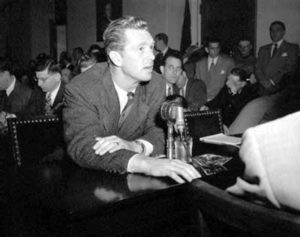 Apr 10: Actor Sterling Hayden, a decorated WWII Marine, testifies before the House Un-American Activities Committee and reveals that he was a member of the Communist Party from June to December of 1946. Hayden had joined the party because he admired the bravery of the Communist Yugoslav partisans while working undercover with the OSS. But he tells the HUAC that joining the party was “the stupidest and most ignorant thing I have ever done in my life.” Hayden’s career wasn’t much affected by his HUAC appearance, but he will later repudiate his cooperation with the committee. He will write in his autobiography, “I don’t think you have the foggiest notion of the contempt I have had for myself since the day I did that thing.” He will also reveal that “the FBI made it very clear to me that, if I became an ‘unfriendly witness,’ I could damn well forget the custody of my children. I didn’t want to go to jail, that was the other thing.”
Apr 10: Actor Sterling Hayden, a decorated WWII Marine, testifies before the House Un-American Activities Committee and reveals that he was a member of the Communist Party from June to December of 1946. Hayden had joined the party because he admired the bravery of the Communist Yugoslav partisans while working undercover with the OSS. But he tells the HUAC that joining the party was “the stupidest and most ignorant thing I have ever done in my life.” Hayden’s career wasn’t much affected by his HUAC appearance, but he will later repudiate his cooperation with the committee. He will write in his autobiography, “I don’t think you have the foggiest notion of the contempt I have had for myself since the day I did that thing.” He will also reveal that “the FBI made it very clear to me that, if I became an ‘unfriendly witness,’ I could damn well forget the custody of my children. I didn’t want to go to jail, that was the other thing.”
![]()
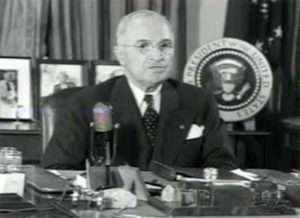 Apr 11: At 1 a.m., White House Press Secretary Joe Short summons reporters to announce that President Harry Truman has relieved Gen. Douglas MacArthur of his Far Eastern commands. Lt. Hen Matthew Ridgway, Commander of the Eighth Army in Korea, is MacArthur’s replacement. These developments are greeted with cheers in Britain’s House of Commons and other European capitals. But protests spontaneously erupt around the U.S. The President responds with a national address at 10:30 p.m. to explain his actions. He says that he fired MacArthur because the General “is unable to give his wholehearted support to the policies of the United States Government and of the United Nations in matters pertaining to his official duties.” Truman adds, “It is fundamental… that military commanders must be governed by the policies and directives issued to them in the manner provided by our laws and Constitution.” Truman’s approval rating will plummet to an all-time low of 22% by the end of the year.
Apr 11: At 1 a.m., White House Press Secretary Joe Short summons reporters to announce that President Harry Truman has relieved Gen. Douglas MacArthur of his Far Eastern commands. Lt. Hen Matthew Ridgway, Commander of the Eighth Army in Korea, is MacArthur’s replacement. These developments are greeted with cheers in Britain’s House of Commons and other European capitals. But protests spontaneously erupt around the U.S. The President responds with a national address at 10:30 p.m. to explain his actions. He says that he fired MacArthur because the General “is unable to give his wholehearted support to the policies of the United States Government and of the United Nations in matters pertaining to his official duties.” Truman adds, “It is fundamental… that military commanders must be governed by the policies and directives issued to them in the manner provided by our laws and Constitution.” Truman’s approval rating will plummet to an all-time low of 22% by the end of the year.
![]()
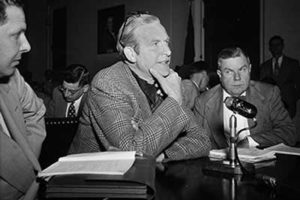 Apr 11: Stage and screen actor Will Geer and screenwriter Robert Lees appear before the House Un-American Activities Committee, where they refuse to say whether they are or have ever been Communists. When Geer is asked, he snaps “ancient history!” He adds, “The word ‘Communist’ is an emotional, hysterical word, like the word ‘witch’ in Salem.” Lees also denounces the committee’s work. “I know of people who can no longer work,” he says angrily. “Careers have been smashed. I have led a respectable life and the seventeen years of work have been destroyed.” Both men are blacklisted. Twenty years later, Geer will be known to millions of Americans as “Grandpa” on the CBS TV series The Waltons.
Apr 11: Stage and screen actor Will Geer and screenwriter Robert Lees appear before the House Un-American Activities Committee, where they refuse to say whether they are or have ever been Communists. When Geer is asked, he snaps “ancient history!” He adds, “The word ‘Communist’ is an emotional, hysterical word, like the word ‘witch’ in Salem.” Lees also denounces the committee’s work. “I know of people who can no longer work,” he says angrily. “Careers have been smashed. I have led a respectable life and the seventeen years of work have been destroyed.” Both men are blacklisted. Twenty years later, Geer will be known to millions of Americans as “Grandpa” on the CBS TV series The Waltons.
![]() Apr 12: Hollywood screenwriter Richard J. Collins testifies before the House Un-American Activities Committee and names twenty-six Hollywood colleagues he says have been or are Communists. Some of those he names are close friends. His career will remain unaffected by his testimony. The same cannot be said for his friends.
Apr 12: Hollywood screenwriter Richard J. Collins testifies before the House Un-American Activities Committee and names twenty-six Hollywood colleagues he says have been or are Communists. Some of those he names are close friends. His career will remain unaffected by his testimony. The same cannot be said for his friends.
![]()
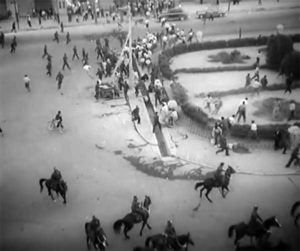 Apr 12: Fourteen people, including three British nationals are killed in a day of fierce rioting in the Iranian cities of Abadan and Bandar Mashur. The worst rioting occurs in Abadan, site of the British-owned Anglo-Iranian Oil Company’s massive refinery works.
Apr 12: Fourteen people, including three British nationals are killed in a day of fierce rioting in the Iranian cities of Abadan and Bandar Mashur. The worst rioting occurs in Abadan, site of the British-owned Anglo-Iranian Oil Company’s massive refinery works.
![]() Apr 13: Two Hollywood actors, Victor Kilian and Fred Grafe, and two writers, Waldo Salt and Paul Jarrico, refuse to cooperate with the House Un-American Activities Committee. Grafe tells the panel he is “pretty indignant” about being called to Washington where “they’re casting only two parts here today, pigeon or stool-pigeon.” Salt says that most of the questions he declined to answer “could be proudly answered, yes or no, in most countries of the world except in Argentina, Spain and this country.” Jarrico is barred from reading his statement. He is allowed to submit it for the record. “I am proud of my beliefs. I am proud of my affiliations. I’ll be damned, though, if I’ll disclose them to my enemies to be used against my friends.” All four are blacklisted. Salt will later win Academy Awards for Midnight Cowboy and Coming Home.
Apr 13: Two Hollywood actors, Victor Kilian and Fred Grafe, and two writers, Waldo Salt and Paul Jarrico, refuse to cooperate with the House Un-American Activities Committee. Grafe tells the panel he is “pretty indignant” about being called to Washington where “they’re casting only two parts here today, pigeon or stool-pigeon.” Salt says that most of the questions he declined to answer “could be proudly answered, yes or no, in most countries of the world except in Argentina, Spain and this country.” Jarrico is barred from reading his statement. He is allowed to submit it for the record. “I am proud of my beliefs. I am proud of my affiliations. I’ll be damned, though, if I’ll disclose them to my enemies to be used against my friends.” All four are blacklisted. Salt will later win Academy Awards for Midnight Cowboy and Coming Home.
![]()
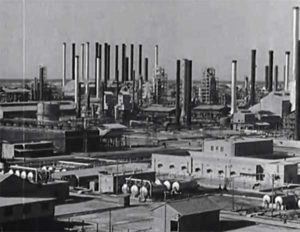 Apr 15: The British-owned Anglo-Iranian Oil Company’s massive refinery in Abadan is forced to shut down due to ongoing strikes and violence. Strikers are demanding that AIOC rescind its 30% wage cut, and demonstrators are demanding that the Iranian government nationalize the oil industry.
Apr 15: The British-owned Anglo-Iranian Oil Company’s massive refinery in Abadan is forced to shut down due to ongoing strikes and violence. Strikers are demanding that AIOC rescind its 30% wage cut, and demonstrators are demanding that the Iranian government nationalize the oil industry.
![]()
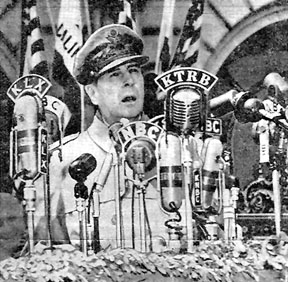 Apr 18: Gen. Douglas MacArthur addresses an estimated 100,000 people in front of San Francisco City Hall, in his first public appearance since returning to the U.S. the night before. With a sign reading “MacArthur for President” just a few feet behind him, MacArthur says he has no intention of running for office. “The only politics I have is contained in the simple phrase known well by all of you: God bless America.” Before his speech, MacArthur was feted with a ticker-tape parade through San Francisco’s financial district.
Apr 18: Gen. Douglas MacArthur addresses an estimated 100,000 people in front of San Francisco City Hall, in his first public appearance since returning to the U.S. the night before. With a sign reading “MacArthur for President” just a few feet behind him, MacArthur says he has no intention of running for office. “The only politics I have is contained in the simple phrase known well by all of you: God bless America.” Before his speech, MacArthur was feted with a ticker-tape parade through San Francisco’s financial district.
![]()
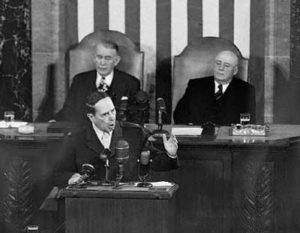 Apr 19: Gen. MacArthur delivers his address to a joint session of Congress, which is broadcast live over radio and television. MacArthur shreds Truman’s Asian policy as “blind to reality.” He again urges opening a second front from Taiwan, bombing the Chinese mainland in Manchuria, and imposing a total naval blockade of China. He then implies that the President has falsely represented him as a warmonger. A New York Times correspondent writes that the memorable speech “challenged the very foundations of the Administration’s foreign policy, furnished a personal rallying point for the opponents of that policy, made the negotiation of a cease-fire in Korea more difficult and started a debate that probably will not be settled until the Presidential election of 1952.”
Apr 19: Gen. MacArthur delivers his address to a joint session of Congress, which is broadcast live over radio and television. MacArthur shreds Truman’s Asian policy as “blind to reality.” He again urges opening a second front from Taiwan, bombing the Chinese mainland in Manchuria, and imposing a total naval blockade of China. He then implies that the President has falsely represented him as a warmonger. A New York Times correspondent writes that the memorable speech “challenged the very foundations of the Administration’s foreign policy, furnished a personal rallying point for the opponents of that policy, made the negotiation of a cease-fire in Korea more difficult and started a debate that probably will not be settled until the Presidential election of 1952.”
![]()
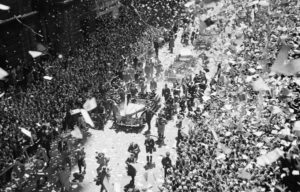 Apr 20: Millions turn out in New York City to greet Gen. MacArthur for the largest ticker-tape parade in the city’s history. Sanitation officials estimate that more than 2,800 tons of shredded paper created what looked like a man-made blizzard over the streets of Manhattan. Police estimate that 7.5 million people lined the parade route, almost double the four million who greeted Gen. Dwight D. Eisenhower at the end of World War II.
Apr 20: Millions turn out in New York City to greet Gen. MacArthur for the largest ticker-tape parade in the city’s history. Sanitation officials estimate that more than 2,800 tons of shredded paper created what looked like a man-made blizzard over the streets of Manhattan. Police estimate that 7.5 million people lined the parade route, almost double the four million who greeted Gen. Dwight D. Eisenhower at the end of World War II.
![]()
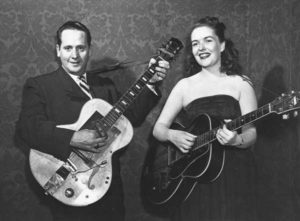 Apr 21: Les Paul and Mary Ford’s single “How High the Moon” begins its nine week run at number one. The single features Les Paul’s pioneering use of overdubbing and multi-track recording that allows Paul to “play” multiple guitars while Ford harmonized with herself.
Apr 21: Les Paul and Mary Ford’s single “How High the Moon” begins its nine week run at number one. The single features Les Paul’s pioneering use of overdubbing and multi-track recording that allows Paul to “play” multiple guitars while Ford harmonized with herself.
![]()
 Apr 23: Actor John Garfield testifies before the House Un-American Activities Committee and swears that he is not, and was not, a Communist. “I have nothing to hide and nothing to be ashamed of,” he says. “My life is an open book. I am no Red. I am no ‘pink.’ I am no fellow traveler. I am a Democrat by politics, a liberal by inclination, and a loyal citizen of this country by every act of my life.” He also says he doesn’t know any Communists in the film industry. Most HUAC members believe him. But Rep. Donald J. Jackson (R-CA) says, “I am not entirely convinced of the whole accuracy and cooperation you are giving this committee, or whether you are naive or forgetful to a point that does not match the intelligence you have shown here.” The star of The Postman Rings Twice (1946), Humoresque (1946), Gentleman’s Agreement (1947), and Body and Soul (1948) will find himself blacklisted, and the stress will kill him a year later at the age of 39.
Apr 23: Actor John Garfield testifies before the House Un-American Activities Committee and swears that he is not, and was not, a Communist. “I have nothing to hide and nothing to be ashamed of,” he says. “My life is an open book. I am no Red. I am no ‘pink.’ I am no fellow traveler. I am a Democrat by politics, a liberal by inclination, and a loyal citizen of this country by every act of my life.” He also says he doesn’t know any Communists in the film industry. Most HUAC members believe him. But Rep. Donald J. Jackson (R-CA) says, “I am not entirely convinced of the whole accuracy and cooperation you are giving this committee, or whether you are naive or forgetful to a point that does not match the intelligence you have shown here.” The star of The Postman Rings Twice (1946), Humoresque (1946), Gentleman’s Agreement (1947), and Body and Soul (1948) will find himself blacklisted, and the stress will kill him a year later at the age of 39.
![]()
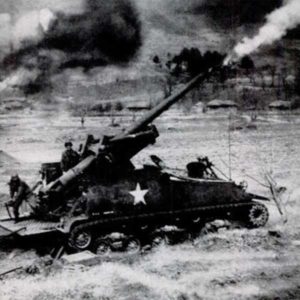 Apr 24: Chinese troops launch their long-anticipated Spring Offensive in Korea, pushing U.N. troops south of the 38th Parallel once again.
Apr 24: Chinese troops launch their long-anticipated Spring Offensive in Korea, pushing U.N. troops south of the 38th Parallel once again.
![]() Apr 24: Character actor Marc Lawrence tells the House Un-American Activities Committee that he had signed a Communist part card in 1938, which he calls a “hideous” mistake.” He then names Sterling Hayden, Lionel Stander, Anne Revere, Larry Parks, Karen Morley and Jeff Corey as Communists. Stander angrily sends a telegram to the committee and demands an opportunity to clear his name. Lawrence will be blacklisted and move to Europe after Stander launches a slander suit against him.
Apr 24: Character actor Marc Lawrence tells the House Un-American Activities Committee that he had signed a Communist part card in 1938, which he calls a “hideous” mistake.” He then names Sterling Hayden, Lionel Stander, Anne Revere, Larry Parks, Karen Morley and Jeff Corey as Communists. Stander angrily sends a telegram to the committee and demands an opportunity to clear his name. Lawrence will be blacklisted and move to Europe after Stander launches a slander suit against him.
![]()
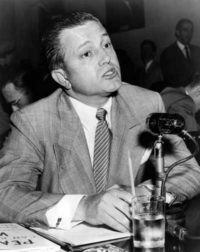 Apr 25: Film director Edward Dmytryk tells the House Un-American Activities Committee that he had been a Communist party member in 1944-45. He accuses twenty-one other Hollywood figures, including six directors of having been party members. In 1947, the Academy Award nominee had been among the Hollywood Ten who went to prison for contempt of Congress for refusing to testify before the HUAC. He will be rewarded for this testimony three weeks later when he is signed to direct Mutiny, his first American film since 1947.
Apr 25: Film director Edward Dmytryk tells the House Un-American Activities Committee that he had been a Communist party member in 1944-45. He accuses twenty-one other Hollywood figures, including six directors of having been party members. In 1947, the Academy Award nominee had been among the Hollywood Ten who went to prison for contempt of Congress for refusing to testify before the HUAC. He will be rewarded for this testimony three weeks later when he is signed to direct Mutiny, his first American film since 1947.
![]()
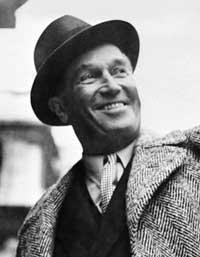 Apr 25: French actor and cabaret singer Maurice Chevalier is barred from entering the United States. Secretary of State Dean Acheson cites Chevalier’s signing of the Stockholm Appeal, a 1950 French Communist party document that calls for “the the outlawing of atomic weapons as instruments of intimidation and mass murder.” Acheson says that Chevalier had received favorable publicity in the French Communist press and sang for a group that was a Communist affiliate. The ban will be lifted in 1954.
Apr 25: French actor and cabaret singer Maurice Chevalier is barred from entering the United States. Secretary of State Dean Acheson cites Chevalier’s signing of the Stockholm Appeal, a 1950 French Communist party document that calls for “the the outlawing of atomic weapons as instruments of intimidation and mass murder.” Acheson says that Chevalier had received favorable publicity in the French Communist press and sang for a group that was a Communist affiliate. The ban will be lifted in 1954.
![]() Apr 26: The Abadan crisis escalates when a special Iranian parliamentary oil commission, under the leadership of Mohammad Mosaddegh, votes to ask the Majlis, the Iranian parliament’s lower house, to set up a governing board to take immediate control of the British-owned Anglo-Iranian Oil company. The commission also recommends that 25% of the operating profits be set aside to compensate the British, pending further negotiations. The U.S. urges Britain to accept nationalization and to negotiate with Iran, saying that Iranian nationalist fervor would be removed if the people felt they had control over their own oil.
Apr 26: The Abadan crisis escalates when a special Iranian parliamentary oil commission, under the leadership of Mohammad Mosaddegh, votes to ask the Majlis, the Iranian parliament’s lower house, to set up a governing board to take immediate control of the British-owned Anglo-Iranian Oil company. The commission also recommends that 25% of the operating profits be set aside to compensate the British, pending further negotiations. The U.S. urges Britain to accept nationalization and to negotiate with Iran, saying that Iranian nationalist fervor would be removed if the people felt they had control over their own oil.
![]() Apr 27: Iran’s pro-western Prime Minister Hossein Ala unexpectedly presents his resignation to Shah Mohammed Riza Pahlev. The resignation comes the day before a special session of the Majlis is expected to approve final plans for the immediate nationalization of the British-owned Anglo-Iranian Oil Company. Britain warns of “very serious and far-reaching consequences” if Iran nationalizes AIOC, which enjoys a monopoly on Iranian oil that is not set to expire until 1993. AIOC supplies 43% of Europe’s petroleum requirements.
Apr 27: Iran’s pro-western Prime Minister Hossein Ala unexpectedly presents his resignation to Shah Mohammed Riza Pahlev. The resignation comes the day before a special session of the Majlis is expected to approve final plans for the immediate nationalization of the British-owned Anglo-Iranian Oil Company. Britain warns of “very serious and far-reaching consequences” if Iran nationalizes AIOC, which enjoys a monopoly on Iranian oil that is not set to expire until 1993. AIOC supplies 43% of Europe’s petroleum requirements.
![]() Apr 28: The Majlis, the lower house of Iran’s parliament, votes unanimously to approve the recommendations of a special Iranian parliamentary oil commission and authorize the nationalization of AIOC.
Apr 28: The Majlis, the lower house of Iran’s parliament, votes unanimously to approve the recommendations of a special Iranian parliamentary oil commission and authorize the nationalization of AIOC.
![]() Apr 28: U.N. forces order the civilian evacuation of Seoul as Chinese and North Korean troops continue their counter-offensive in Korea.
Apr 28: U.N. forces order the civilian evacuation of Seoul as Chinese and North Korean troops continue their counter-offensive in Korea.
![]()
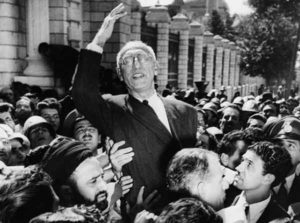 Apr 30: The Shah of Iran formerly names Mohammad Mosaddegh, the head of the National Front, as Prime Minister after the Majlis (Parliament) nominates him in a 79-12 vote. The appointment of the firebrand nationalist touches off a wave of celebrations cross Iran. Meanwhile, Iran’s Senate approves the Majlis’s plan to nationalize the British-owned Anglo-Iranian Oil Company.
Apr 30: The Shah of Iran formerly names Mohammad Mosaddegh, the head of the National Front, as Prime Minister after the Majlis (Parliament) nominates him in a 79-12 vote. The appointment of the firebrand nationalist touches off a wave of celebrations cross Iran. Meanwhile, Iran’s Senate approves the Majlis’s plan to nationalize the British-owned Anglo-Iranian Oil Company.
![[Emphasis Mine]](http://jimburroway.com/wp-content/uploads/2018/02/Witnesses.jpg)
